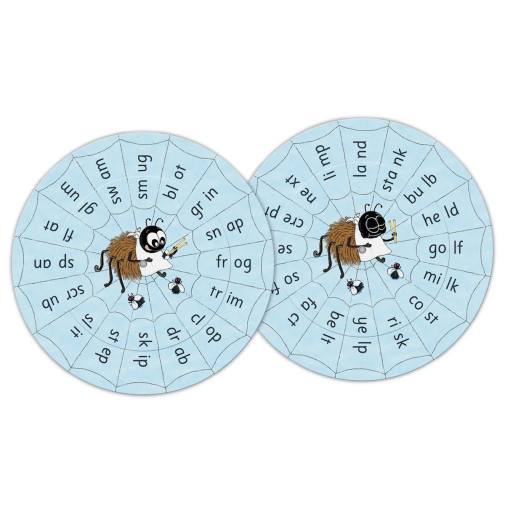We use cookies to make your experience better. To comply with the new e-Privacy directive, we need to ask for your consent to set the cookies. Learn more.
Jolly Phonics Blend Wheels (Print Letters)
Useful for building words, this clever, nesting wheel within a wheel has the overall appearance of a spiders web. The inner wheel (web) has beginning consonant and vowel combinations; outer wheel, ending blends/digraphs. For instance, an inner be can be paired with an outer st, lt, nt, or nd. Each side of the device contains an inner and an outer wheel. A cute little spider busily spins in the middle of the web.
The Jolly Phonics Blends Wheels will develop childrens awareness of initial and final consonant blends for reading and writing. The wheels are double-sided, so that initial consonant blends can be made on one side and final consonant blends on the reverse. These can be used in conjunction with the Grammar 1 Handbook or Student book to reinforce lessons in a fun and engaging way. The blends wheels come with an instruction sheet which provides tips and guidance on how to blend wheels can be used. Age 5+.
Kids will have a jolly good time learning to read with this well-constructed program which originated in Great Britain. With the help of winsome Inky Mouse and her friends, Snake (a truly lovable snake if there ever was one) and Bee, five skills are taught in tandem throughout the program and at three age levels. Each level reviews and expands upon the previous content. A truly spiral program.
- Stories Board Book plus Activities Books (ages 3+)
- Finger Phonics plus Workbooks and Level 0 Readers (ages 4+)
- Student Books plus Decodable Readers (ages 5+)
These each cover the same seven groupings of 42 letter sounds (non-alphabetical). These groupings and progression allow immediate decoding of many words. Accompanying skills are: learning letter sounds, learning letter formation (handwriting), blending, identifying the sounds in words, and learning tricky (irregular) words.
The lesson material is straight-forward, but fun. Stories of the three friends provide the context for all the instructional information. Children learn via visual, auditory, and tactile-kinesthetic modes (for instance, sky writing and finger-tracing of letters). Letter sounds are introduced along with a set of movements that serve as mnemonic devices. All program components are high quality, well-designed, and easy to use; most are brightly colored.
The black and white Phonics Handbook provides an interesting low-cost option particularly for a class, however. It similar content to the colorful Student Books and Teacher Book minus the winsome mascot characters but the content in the Handbook is reproducible. The Handbook can be used by itself or alongside any of the other, more colorful components. Note: You do not need to have the Handbook in order to use the Student and Teacher Books.
Letter introduction in this series is a bit unusual and in the following order:
- #1: s, a, t, i, p, n
- #2: c/k, e, h, r, m, d
- #3: g, o, u, l, f, b
- #4: ai, j, oa, ie, ee, or
- #5: z, w, ng, v, oo (two sounds)
- #6: y, x, ch, sh, th (two sounds)
- #7: qu, ou, oi, ue, er, ar
All materials follow this order and most have components that are numbered accordingly (i.e. Finger Phonics Books 1-7). Initially only one way of representing each sound is presented. Later, the main alternatives spellings are covered. For example, at first the long a sound is taught with the /ai/ spelling as in rain. Later the alternatives /ay/ as in day, and /a_e/ as in came are taught.
The spiral nature of the components provides interesting options. You can begin at any of the age levels. Instruction builds within a level but each level also reviews all previously taught concepts so you won't miss any content. There is overlap in terms of appeal between the levels for certain components (i.e. Songs) meaning some of the media items can be used for the PK level as well as K. In general, the components for each level are as follows:
- Ages 3+ (PK): Stories Board Book and Activities Book. Also enjoyed: DVD, Songs Book/CD, Letter Sound Poster
- Ages 4+ (K4): Finger Phonics Books 1-7, Workbooks 1-7, and Decodable Readers Level 0. Also enjoyed: DVD, Songs Book/CD, Letter Sounds Poster, Word Book
- Ages 5+ (K): Student Books 1-3, Teacher Book, Decodable Readers Levels 1-2. Also enjoyed: Word Book, Dictionary, Blend Wheels.
- Ages 6+ (1): Decodable Readers Levels 3-5 (plus Jolly Grammar Level 1).
Rainbow Resource has packages geared to these levels.
There are several apps for smartphones and tablets available at the respective app stores. Some are free and some require a small fee. Jolly Phonics Letter Sounds, Jolly Phonics Lessons, Jolly Songs, and an app for teachers.
In summary, Jolly Phonics is an excellent program whether beginning with a PK or K student. In a relatively short time, they will be reading and writing. It goes much deeper than most beginning phonics programs, though stops just little short of a complete K-2 program. Follow up with Jolly Grammar for a solid grammar and spelling program that expands upon the phonics program and provides excellent language arts instruction.


for my special needs classroom
Phonics